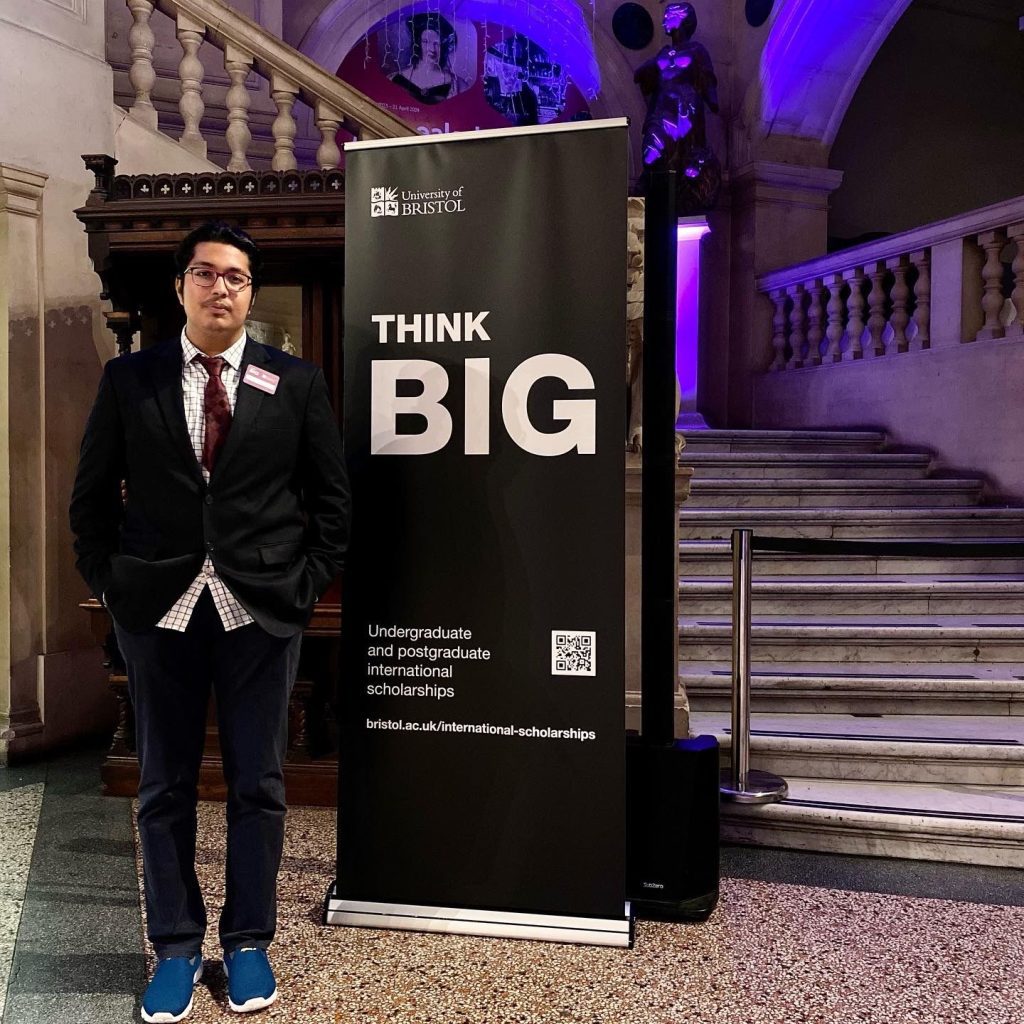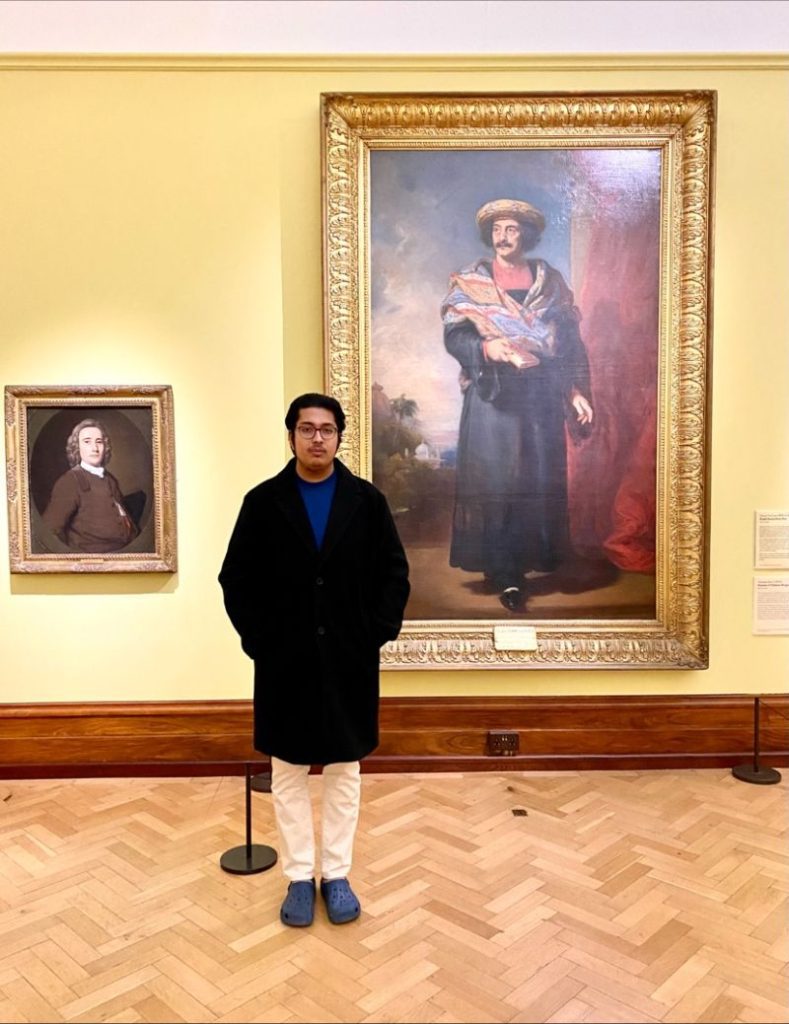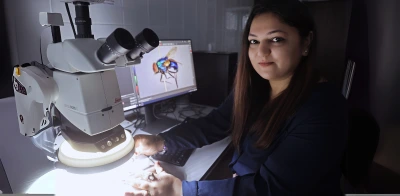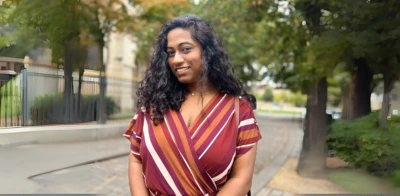Name: Souhardya De | Institution: University of Bristol, United Kingdom | Course: BA (Hons.) History at UoBristol, UGCert History at Cambridge
Key Highlights:
- Guaranteed housing for international freshmen at Bristol University but tougher in subsequent years.
- Balancing proximity to campus with affordability poses a challenge.
- Multicultural environment eases cultural adjustment and country-specific societies and mentorship programmes provide valuable support.
- Part-time employment has its benefits beyond financial gain as it provides good networking opportunities.
Souhardya De bagged the Think Big Scholarship offered to international students by the University of Bristol for his undergraduate studies in History. He had completed a UGCert in History at the University of Cambridge before starting his studies as a Bachelor of Arts (BA Honours) student of History at the University of Bristol.
The history enthusiast was conferred the PM’s Bal Shakti Puraskar in the art and culture category by the President of India for writing two historical fictions – ‘Scion of Suryavansh: The Ramayana’ and ‘The Chronicles of Suryavansh: The Rise and Fall of the Suryavanshis.’ He is also a recipient of the Gold Award at the Royal Commonwealth Society’s Queen’s Commonwealth Essay, KAMP Inspiring Achievers Award by CSIR-NIScPR, Ministry of Science and Technology, Government of India, and a High Commendation Prize in History from the John Locke Institute at Oxford. Selected one of the 75 Prime Minister’s YUVA Fellows from thousands of applicants Souhardya got the opportunity to write a book published by the National Book Trust of India. The book ‘Pratap Jung: the Ultimate Sacrifice’, was exhibited in international book fairs in London, Seoul, Abu Dhabi, New Delhi, and Colombo, and has been catalogued by the British Council Library.

Souhardya De at Think Big Scholars’ reception organised by the University of Bristol
What does Think Big Scholarship of Bristol University entail?
University of Bristol selects exceptional international students for its Think Big Scholarship. The undergraduate and postgraduate scholarships are valued from £6,500 to £13,000 per year and can only be used towards the cost of tuition fees. Applicants may also be eligible to receive a £3,000 living cost bursary during their first year of study.
Who can apply for Bristol University’s Think Big Scholarship?
Those who are classed as an overseas student for fee purposes and those who have applied to start any full-time undergraduate or postgraduate course, (excluding dentistry, medicine, and veterinary science) at the University of Bristol.
If one applies for Think Big scholarship, he / she will also automatically be considered for any other University of Bristol international scholarships that one might be eligible for. An individual need not submit two separate applications.
Why did you choose to study at Bristol University?
Bristol’s significance to me, as a history enthusiast from West Bengal, lies not only in its beauty but also in its close association with notable Brahmo-Samajists of Bengal, Rajah Rammohun Roy, the great Bengali social reformer and Prince Dwarakanth Tagore, the grandfather of Rabindranath Tagore. Life and legacy of the founding fathers of the Bengali renaissance is well celebrated here with art and architecture and a day marked for annual tributes.

Souhardya De at Bristol Museum and Art Gallery
How is your academic life at Bristol University?
As someone majoring in History, the curriculum-specific study I undertake at Bristol University is quite broad-ranging – both in terms of academic modules covered and the timeframe studied. My specific interest is in socio-political and economic history.
At Bristol, you also have the freedom to choose an optional unit and it could be anything ranging from intermediate French to a module on Religions of the East such as Buddhism and Hinduism.
What challenges have you faced as an international scholar in the UK?
Humanities courses in the UK – particularly history, language courses and politics are well known for their emphasis on cite-it-right. For international students from educational backgrounds where introduction to academic citation and referencing did not form a component of their high-school education, it became important to follow and execute style guides effectively. I sought help from the faculty director.
In universities like Bristol, there are a number of commissioned Royal Literary Fund Fellows who are happy to chat about the aforementioned challenges and provide professional academic writing guidance.
I might be overly focussed on academia, though, so it is also important to note that challenges outside of academia might include homesickness or the inability to find proper accommodation after your first year at university.

Souhardya De at Bristol Museum & Art Gallery
Why do you love history so much?
My father is a history professor while my mother teaches history in school, so I was naturally drawn towards history and historical monuments. I believe doing History at university offers a strong inter-disciplinary foundation, through which to accumulate profound insights into the characters and events that have been fundamental in shaping the modern world, thus facilitating a better-informed analysis of present-day happenings. I believe this, in particular, aligns strongly with my aspiration to work in the government sector in the future.
What are your extracurricular interests?
I had the option to choose to volunteer or intern at institutions working in course-allied disciplines such as museology and library studies and experience first-hand the work done at museums and archives etc. This is something particularly offered in university-towns such as Bristol and Cambridge where the major feeder-institute for the museums are mostly university students from around the region. With interest in museology, I have been devoting my time in it, and have visited some of the best places Bristol has to offer.

Souhardya De at the Red Lodge in Bristol – a global cultural heritage
Is finding an accommodation easy at Bristol?
At Bristol University, student-housing for international freshmen is guaranteed at a university hall of the student’s budgetary preference. So, I didn’t face much problem in the first year. However, from the second year onward, it becomes a tough job to find proper affordable housing in Bristol or any other university in the UK. Students have to make a choice of either too far a place from where the University is located, or choose an expensive accommodation to live near the campus.
Did you experience any problem in settling in the new place?
Due to multiculturalism in the UK and inside the campus I did not find myself in an alien land. However, for those who experience culture shock, joining a country-specific society to connect and chat with fellow overseas students about their experiences alongside attending university and events, such as the dedicated Global Lounge events in Bristol prove helpful. In addition, dedicated mentorship programmes such as the Peer-Assisted Study Sessions (PASS), Peer Mentorship at Bristol and communities like the ‘Scholarships Recipients’ offer a great support ecosystem to ensure you thrive at university and beyond.
Have you managed to build connections and networks?
At Bristol, building connections – both within and beyond academia, for overseas candidates is a fairly straightforward endeavour. It is important to gain as much from your assigned peer mentor in the first year as possible. PASS Leaders help with academic support and guidance. Beyond that, since small-group seminar style teaching is the norm at universities in the UK, I have fostered an intellectually healthy rapport with my professor. My part time job inside the campus has also helped me build connections.

Souhardya De at the UK Parliament Square, London
Have you taken on any part-time work?
I have had part-time roles within the university since starting at Bristol. I have been a fundraising associate for the Development and Alumni Relations Office (DARO) and am presently an International Scholarships Ambassador with the International Office under the purview of Bristol’s Global Engagement division. One good thing about working with the University or any recognised institution, for that matter, is that they know and value your academic commitments so you are not burdened with workload from your part-time engagement and end up prioritising that over academia in the process.
For me, the value of part-time employment goes over and beyond its financial output – whilst it is true that earning gives you a sense of financial independence at university. The reason I so highly value part-time engagement is because of the experience you gain working with the offices you are associated with and the fantastic networking you get to do.
How do you balance your studies, extracurriculars, and leisure time with a part-time job?
Managing academic demands with external commitments like part-time jobs or internships can be challenging. Student visa regulations ensure that no international student overworks themselves – for overseas candidates in the UK, the limit is of a maximum of 20 hours every week.
Tips for international students
- Capitalize on opportunities available: Utilise resources offered by your new city and university for personal growth.
- Explore your surroundings: Join societies. Embrace diverse perspectives.
- Seek support when needed: It’s okay to feel homesick. Connect with people from your home region. Utilize university resources for mental health support.
- Build connections for future job recommendations: Seek part time roles. Gain interview practice. Network with industry professionals.
Follow Souhardya De on LinkedIn




